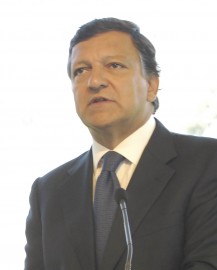
The BBC appears to have taken some kind of corporate decision to refer to the post of president of the European Council as “president of Europe” or “president of the EU”. (Here, for example.) Sometimes, when they’ve got the space, they use the proper term, but they are willing to use the misleading shorthand.
Of course, one has to accept that the national broadcaster is entitled to use the vernacular rather than stick to the technical terms, in order to be comprehensible to the audience, but that vernacular should not serve to be misleading, which the term “president of Europe” is.
First of all, the powers of the president of the European Council are nowhere near as extensive as those conjured up by the notion of a president of Europe. He chairs, he does not lead. He certainly does not “rule” (pace the Daily Express yesterday) nor does he “control” the European Council, as the BBC political analyst Mark Sanders said on the Richard Bacon show when I was a guest. Do not get carried away with the novelty.
Second, if one must use the term “president of Europe” because it is so convenient and attractive, use it to describe the president of the Commission. It is the Commission president who sets the legislative agenda, controls the budget, and manages the civil service staff, not the Council president. Better not to use the term at all, but if you must, it is President Barroso.
The fact that the European Council president chairs but does not lead gives the lie to the second bit of nonsense on the TV last night, when ITV declared that the procedure being followed was ridiculous: each national government leader expressing views about other potential candidates as and when their names emerge, rather than anything more formal. Think about how the secretary-general of the United Nations is chosen, or the secretary-general of Nato. The EU is simply following that method.
Now, federalists criticise the way that intergovernmental organisations take decisions like this, and we would criticise the manner in which the European Council president is being chosen, too, but the EU is not unusual in behaving in this manner now. Above all, the realisation that this is the method being followed must impact on the expectations that some people have of the post and, by contrast, the relative expectations that they should have of the Commission president instead.
